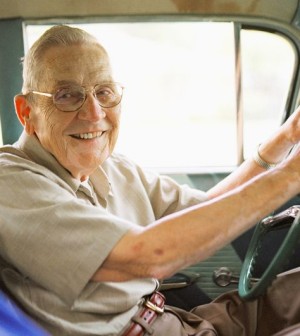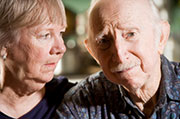- Big Health Care Disparities Persist Across the U.S., New Report Finds
- Teens Often Bullied Online About Their Weight: Study
- Work That Challenges Your Brain Helps You Stay Sharp With Age
- Urine Test Might Spot Head-and-Neck Cancers Early
- Many Seniors Are Overmedicated, But ChatGPT Might Prevent That
- Antipsychotics May Do Great Harm to People With Dementia: Report
- Two-Drug Combo Curbs Drinking for People Battling Severe Alcoholism
- Most Homeless Americans Are Battling Mental Illness
- FDA Recalls Heart Failure Devices Linked to Injuries and Deaths
- COVID Does Not Spur Asthma in Kids, Study Finds
Hobbies Important for Stroke-Victim Caregivers


It’s important for people who look after stroke survivors to continue their own hobbies and interests because it helps keep them happy, a new study finds. And that’s good for the patient, too, the author says.
The study included about 400 family members providing care at home for a loved one who suffered a stroke. Most of the caregivers were women (69 percent) and married to the patient (70 percent). The caregivers completed several questionnaires at the start of the study, and 80 of them did so again two years later.
The happiest caregivers were those who kept doing their hobbies and activities, were older, and had better physical health. Also happier were caregivers who provided higher levels of care and cared for stroke survivors with less mental impairment, depression or memory problems.
One surprising finding of the study, which appeared March 20 in the journal Stroke, was that caregivers were happier if their loved one survived a more severe stroke, said lead author Jill Cameron, an associate professor in the department of occupational science and occupational therapy at the University of Toronto.
“But when a stroke is labeled mild, expectations are high and the issues are more subtle,” Cameron said in a journal news release. “That can cause more frustration because survivors of a mild stroke still have problems.”
Cameron said stroke survivors often return home from the hospital just days or weeks after their stroke, which gives a family caregiver little time to prepare.
“That might be one reason older caregivers are the most content,” she said. “They’re more likely to be retired and less likely to have to juggle responsibilities of a job and children along with providing post-stroke care.”
A caregiver’s attitude about the situation affected their happiness, the study also found. Those who felt they could handle caring for their loved one and that they would grow from the experience were happier.
If health care providers know which factors help caregivers stay positive, they could make adjustments to better support stroke survivors and their families, Cameron said.
“If the family is doing better, that helps the patient do better,” she said.
More information
The U.S. National Stroke Association offers advice for stroke survivor caregivers.
Source: HealthDay
Copyright © 2024 HealthDay. All rights reserved.










